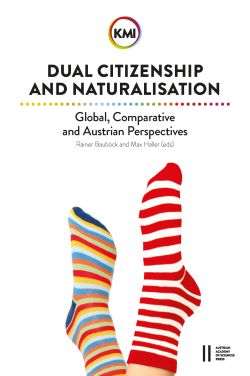Rainer BAUBÖCK - Max HALLER (Hg.)
Dual Citizenship and Naturalisation
Global, Comparative and Austrian Perspectives
Stephan Marik-Lebeck
S. 229 - 252
Verlag der Österreichischen Akademie der Wissenschaften
doi:
10.1553/978OEAW87752_Chapt11
Abstract:
Naturalisation in Austria, as in most countries, is bound by certain conditions. Among others these entail an uninterrupted stay in the country for at least ten years (in special circumstances, only six years are required). Information from the Central Residence Register processed in the population statistics of Statistics Austria allows for an estimation of how many people currently living in Austria would fulfil this specific condition and therefore potentially qualify for naturalisation. The chapter presents the results of these estimations, disaggregated by citizenship, age and region of residence. EU/EFTA citizens in Austria have little propensity for naturalisation. Among non-EU/EFTA citizens, the propensity for naturalisation was higher and increasing over time. The naturalisation of all non-EU/EFTA citizens with ten years or more of residence in Austria would reduce the share of foreign citizens there from 16.7 to 13 per cent. This would roughly offset the increase in the foreign population in Austria in the last five years. The naturalisation of eligible EU/EFTA citizens would further reduce the foreigners’ share in the population to 10 per cent. If persons with a residence period of between six and ten years were also all naturalised, the percentage of foreigners would drop even further to 7.5 per cent, less than half the actual share recorded on 01 January 2020. At a regional level, Vienna has the highest potential for naturalisation, followed by Vorarlberg and Salzburg, if only non-EU/EFTA citizens residing there for ten years or more are counted.
2021/05/05 12:55:20
Object Identifier:
0xc1aa5576 0x003c7004
Rights:All rights reserved.For questions regarding copyright and copies please contact us by email.
The toleration of dual citizenship has become a global trend as states try to retain ties to their emigrants or to encourage their immigrants to naturalise. This volume examines changes in state attitudes to dual citizenship and their social impact, zooming in from analyses of global dynamics to a series of country case studies that illustrate the variety of reasons and intentions behind dual citizenship reform. Finally, five chapters provide the most thorough analysis of the special Austrian case so far. They show the size of Austria’s untapped potential for naturalisation of immigrants, the incoherence of its citizenship policies at home and abroad and the need for a comprehensive reform.
…
Die Duldung der doppelten Staatsbürgerschaft ist zu einem globalen Trend geworden, weil Staaten versuchen, die Bindung zu ihren Auswanderern aufrechtzuerhalten oder ihre Einwanderer zur Einbürgerung zu ermutigen. Dieser Band untersucht diese Änderungen der staatlichen Haltung und ihre sozialen Auswirkungen. Er beginnt mit Analysen der globalen Dynamik und fokussiert anschließend auf Länderfallstudien, die die verschiedenen Gründe und Absichten hinter Reformen der Doppelstaatsbürgerschaft veranschaulichen. Abschließend bieten fünf Kapitel die bislang gründlichste Analyse des österreichischen Sonderfalls. Sie zeigen die Größe des ungenutzten Einbürgerungspotenzials in Österreich, die Inkohärenz seiner Staatsbürgerschaftspolitik gegenüber Ein- und Auswanderern und die Notwendigkeit einer umfassenden Reform.




 Home
Home Print
Print
 References
References
 Share
Share
